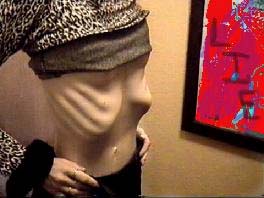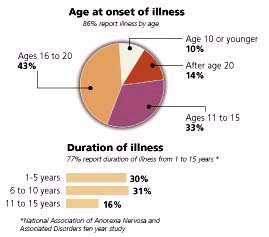Eating disorders have psychological components. People who suffer from anorexia have two factors that influence their decisions. These are subconscious forces and external forces. Though external forces can be controlled, it is much more difficult to control the subconscious ones.
Anorexia Nervosa:People with anorexia have low self-esteems. It is a disorder most commonly found in women, and especially teenage girls. With anorexia, sufferers often have an intense fear of food. Many are perfectionists that are obsessed with their weight, and have a severe concern of getting fat. Despite being underweight, many anorexics perceive themselves as being fat when looking into a mirror. Many have this distorted body image. They often deny being underweight as a result of this distortion. Anorexics are constantly weighing themselves and complain of being "too fat" when in reality, they are too thin.
There are many other symptoms of anorexia. Anorexics are obsessed with counting each and every calorie that they consume. They often make excuses for their unusual eating habits, and are often very secretive. Many exercise excessively because they are so focused and staying thin. The lack of food and overexertion that comes from excessive exercise causes many anorexics to have fainting and dizzy spells. They often have difficulty concentrating and have less interest in activities they used to enjoy. In addition, they are often irritable, depressed, or have obsessive-compulsive behavior. Their complexion is often pale and dry, and sometimes even yellowish. Many anorexics also wear baggy clothing to hide their rapid weight loss from their friends and family.The heath effects of anorexia are very serious. Many anorexics will have hair loss from the lack of nutrients they are receiving. They will also suffer from fatigue and lack of energy. Many become dehydrated and have many dizzy spells and headaches. Their kidneys and liver can also become severely damaged. They can lose bone mass and suffer from osteoporosis. Many anorexics will also stop menstruating. They can also have constipation and stomachaches. In addition, anorexia can also cause people to have irregular heartbeats and even go into cardiac arrest. Ultimately, death is a very real possibility for people who have anorexia and are left untreated.
There are treatments for anorexia. The first step is for the sufferer to admit that they have a problem and be willing to ask for help. With the support of friends, family, and physicians, anorexics can usually begin to change their eating habits and come closer to having a normal weight. At first, the patients may be fed through an IV because they may still refuse to eat. They are given the nutrients that they had deprived themselves of for long periods of time. Usually, they are put on diets of about 1500 to 2000 calories a day. Once the patients become more comfortable eating, this amount is usually increased. At the same time, anorexics often receive psychotherapy to help them feel better about themselves and gain self-esteem. The road to recovery is very long and difficult for anorexics, but with the proper support and medical treatment, it is possible to complete.
Bulimia Nervosa:
Bulimia is another eating disorder that is most commonly found in women and teenage girls. People with bulimia also have low self-esteems. Unlike anorexics, bulimics can have normal body weights, or even be overweight. Many of them are also high achievers and are perfectionists. Bulimia is caused by dissatisfaction with a person's body image. There are also biological factors. Studies have shown that bulimia is more common in relatives of people suffering from bulimia than in the general population. This is because there may be genetic influences.
There are many symptoms of bulimia. Bulimics have episodes of binge eating in which they have little or no control over the amount of food they consume. They may also the go through many episodes of purging to get rid of the excessive calories they consumed while binging. Frequent trips to a bathroom may be made in order to do this. The purging can cause many dental problems because the stomach acids wear away tooth enamel. In addition to repeated self-induced vomiting, they may abuse laxatives or diuretics in an attempt to lose weight. Bulimics may also get heartburn, indigestion, bloating, constipation, or permanent colon damage, among other negative effects. Stomach ulcers, electrolyte imbalances, and irregular heartbeats are other medical complications that may result from bulimia as well.
Bulimia can be treated. Treatment needs to help the patients both physically and psychologically. The physical heath of the patients needs to be restored along with normal eating patterns. In addition, psychologists are also very useful in helping the patients raise their self-esteems. Bulimia is another disorder that is very difficult to overcome, but with the support of friends, family, and physicians, recovery is possible.
http://admin.acadiau.ca/counsel/Edisorder/
People with eating disorders often have distorted body images of themselves.
http://www.esu9.org/~bluehill/DP/Disorders/true_home_ed.html
People with anorexia become extremely underweight.
http://www.esu9.org/~bluehill/DP/Disorders/true_home_ed.html
People with eating disorders often exercise excessively.
http://www.caringonline.com/images/piechart.jpg
The graph above shows the ages in which people suffering from anorexia first become anorexic.



